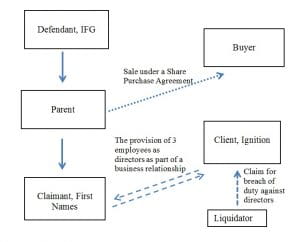- Home
- Blogs
- Compact Contract
Implying an obligation to indemnify: the Jersey law perspective
Browse this blog post
In First Names v IFG, the English High Court determined that, under Jersey law, a company’s implied obligation to indemnify an employee will arise where it is considered necessary to ensure the employee's employment contract is not futile, inefficacious or absurd.
First Names was incorporated in Jersey and provided corporate and trust-management services. As part of a business relationship with a client, Ignition, First Names provided Ignition with individuals to serve as directors of Ignition, a common practice in the industry. Ignition subsequently went into liquidation and the liquidator claimed those directors had acted in breach of their duties. First Names believed it was obliged to indemnify its employees in respect of that action.
IFG sought to deny any liability on behalf of First Names, having sold First Names' parent under a share purchase agreement which included an indemnity covering all liabilities arising from circumstances existing prior to completion. First Names, in turn, sought recovery from IFG pursuant to the share purchase agreement.
The Court held:
- Any implied obligation to indemnify was a question of Jersey law because First Names was incorporated in Jersey. According to experts of Jersey law, an indemnity would be implied into the directors’ employment contracts if considered necessary to ensure that those contracts were not futile, inefficacious or absurd. The Court decided that this test had been met because the appointment was required under those employment contracts and First Names received remuneration for the employees’ roles as directors. The Court also considered two further points: there was neither difficulty nor complexity in identifying the terms of any indemnity; and, there was an understanding in the industry that employees in this situation would be indemnified.
- First Names and the buyer had complied with all terms of the share purchase agreement and so IFG had an obligation to indemnify First Names pursuant to that agreement.
